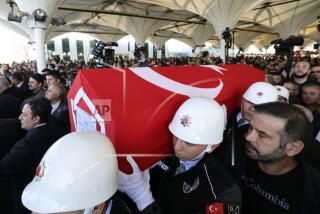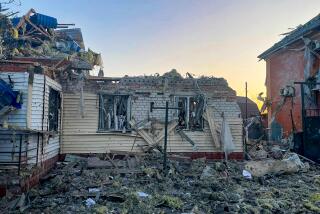Turkey threatens incursion after Kurds kill 12 troops
- Share via
ISTANBUL, TURKEY — Escalating hostilities near Iraq’s northern border, Kurdish rebels ambushed a Turkish army patrol on Sunday, killing at least 12 soldiers and raising the specter of a major cross-border retaliation by Turkey.
Turkey was quick to issue that threat -- while also hinting at restraint. Turkish officials, who held a late-night emergency meeting, said they would “pay any price” to protect their citizens and fight what they, and the United States, regard as a terrorist organization.
Prime Minister Recep Tayyip Erdogan said later in a news conference that U.S. Secretary of State Condoleezza Rice had telephoned him and asked for “a few days” before Turkey launched any kind of major retaliatory operation.
Erdogan said he reminded Rice that “Turkey was expecting quick steps from the U.S. as a requirement of the strategic alliance” between the two countries. “She requested Turkey give the U.S. a few days to take certain steps,” he said.
For nearly 24 hours after the ambush, Turkish helicopters and ground forces shelled suspected guerrilla hide-outs and escape routes along the rugged Turkish-Iraqi border, killing at least 32 rebels, the Turkish general staff said.
The separatist Kurdistan Workers Party, or PKK, which seeks an independent Kurdish homeland in southeastern Turkey, claimed it had taken an unspecified number of Turkish soldiers hostage. Turkish news reports also said several soldiers were missing, but Defense Minister Vecdi Gonul denied there were any hostages.
The attacks intensified pressure on the Turkish government to move against the rebels, but Ankara also demanded that U.S. forces crack down on PKK guerrillas sheltering in northern Iraq.
Gonul said Turkey was planning cross-border retaliation against the PKK, but “not urgently” and was hoping it would be conducted in alliance with the U.S. military.
“We’d like to have something tangible” from the United States, Gonul told reporters in Kiev, Ukraine, after a meeting with U.S. Defense Secretary Robert M. Gates, the Associated Press reported.
Erdogan is scheduled to meet with President Bush on Nov. 5 in Washington, and the PKK undoubtedly will top their agenda. Through a spokesman, Bush denounced the new violence by “PKK terrorists” and called for the attacks to “be dealt with swiftly by the Iraqi government and Kurdish regional authorities.”
In Ankara, the Turkish military said the PKK rebels had crossed from northern Iraq into the southern Turkish province of Hakkari just after midnight. They blew up a bridge about three miles from the border as an army infantry unit crossed, and then fired on the troops from three sides. In addition to the 12 dead, 16 soldiers were injured, Turkish officials said.
Separately, 17 civilians were injured, six seriously, when a wedding convoy traveling near the site of the ambush was hit by what officials said was a land mine planted by the rebels.
Rage swept Turkey, with demands of revenge and reports of demonstrations in several cities. In one town, Bursa, protesters vandalized the headquarters of a Kurdish political party, destroying furniture, shattering windows and draping the office with a Turkish flag.
The ambush comes in an especially tense period, with Turkish authorities threatening to cross into northern Iraq to root out Kurdish guerrilla camps there. Turkey’s parliament authorized the government to carry out such incursions last week, despite calls for restraint from Washington, Baghdad and elsewhere.
Erdogan presided over the emergency meeting Sunday to plan a possible incursion.
“Our anger, our hatred is great,” the prime minister said before the session.
When officials emerged grim-faced hours later, they issued a statement accusing the PKK of attempting to use “heinous attacks” to “disrupt unity and integrity of our society.”
“Although Turkey respects Iraq’s territorial integrity, it will not tolerate that terrorism is aided and abetted there, and it will not refrain from paying any price to protect its rights and law, territorial integrity and its people,” the government said.
The statement added, however, that the government would try to avoid harming relations with other countries -- a signal that it might heed calls for diplomacy.
Turkey has long been demanding that U.S. forces take action against PKK rebels who have found refuge in northern Iraq’s relatively peaceful semiautonomous Kurdish region.
Iraqi officials, nervous about the destabilizing effects that a Turkish incursion could unleash, have urged restraint.
Iraqi President Jalal Talabani, an ethnic Kurd, called on the PKK to halt its attacks or disarm.
“The era of war has ended, and we called on our brothers to cease fighting, leave behind militarism and head to peace and civilian life,” Talabani said. “But if they insist on fighting, then they should leave our country and not create problems for us in Kurdistan.”
He was speaking at a joint news conference with Kurdish leader Massoud Barzani, who repeated his warning that the Iraqi Kurdistan region would be forced to defend itself if Turkey were to invade.
The Iraqi parliament, after intense debate Saturday, approved a resolution Sunday denouncing Turkish threats to invade Iraq as a violation of national dignity. Lawmakers amended the resolution to add criticism of the PKK and denounce “all armed activities against neighboring countries starting from Iraqi lands.”
Turkish officials are demanding that both the central government in Baghdad and the Kurdish regional government move against the PKK. By threatening to invade, Turkey is hoping to force the U.S., especially, to crack down on the Kurdish rebels.
For Iraqi Kurds, the PKK issue has been especially problematic. Although they don’t want to be drawn into Turkey’s battle, many are also reluctant to act against their ethnic brethren.
In Sulaymaniya, in northern Iraq, hundreds of Kurds demonstrated Sunday against a possible Turkish incursion.
“The Turkish threats against the Kurdistan region are actually aimed against the Kurdish political existence,” said Rayzin Ibrahim, 22, one of the organizers of the flag-waving, chanting Kurds.
Reflecting their ambivalence, neither Talabani nor Barzani would label the PKK as terrorist, as Turkey, the U.S. and Iraq have done. They also said that if neither the U.S. nor the Turkish military had been able to vanquish the PKK, they couldn’t be expected to do so.
Asked whether he would be willing to comply with Turkish demands to hand over PKK leaders, Talabani responded, “We will not hand to Turkey any leaders, not even a Kurdish cat.”
Borg reported from Istanbul and Ahmed from Sulaymaniya, Iraq. Times staff writers Saif Rasheed in Baghdad and Tracy Wilkinson in Rome contributed to this report.
More to Read
Sign up for Essential California
The most important California stories and recommendations in your inbox every morning.
You may occasionally receive promotional content from the Los Angeles Times.












